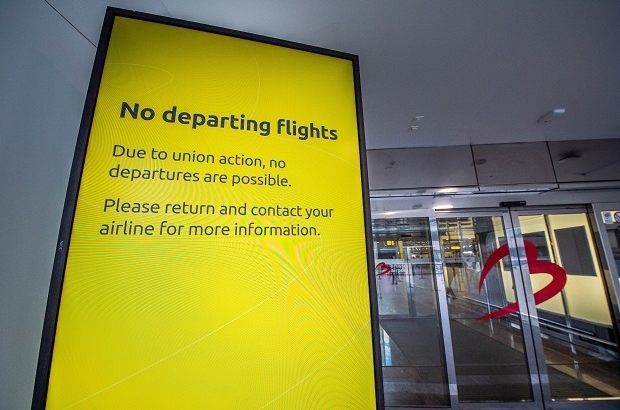- Daily & Weekly newsletters
- Buy & download The Bulletin
- Comment on our articles
31 March national strike: no flights, limited public transport
A national strike on Monday 31 March is expected to affect schools, public transport and flights, with none of the almost 250 scheduled departing passenger flights able to take off from Brussels Airport.
There will also be disruption to arriving flights, as many security personnel and handling agents will also join the strike. Travellers are advised to consult their airline or the Brussels Airport website for details. All flights to and from Charleroi Airport have also been cancelled.
The strike is in protest against the federal government's plans, which workers and the Belgian Labour Federation, FGTB and trade union confederation CSC say will negatively impact a number of sectors, from policing and transport to education and postal delivery.
Several actions could take place in various areas of economic activity, including the setting up of picket lines. These disruptions could bring public services to a standstill.
Mail delivery is expected to be affected, along with waste collection. Recycling centres are likely to be closed, prisons will operate at reduced capacity and hospital care teams could also be reduced to a minimum in some public hospitals.
Unions have described the government agreement as a "declaration of war" against the entire world of work and have said that this strike would be part of a "marathon of resistance" planned to last throughout the legislature.
“There is a lack of respect overall,” said a CSC spokesperson. “We need to send a clear signal.”
The CGSLB (General Federation of Liberal Trade Unions of Belgium) will not be participating in the strike, with president Gert Truyens saying: “We are convinced that solutions will be implemented at the negotiating table. Our priority is to strengthen consultation and ensure that the voice of the workers is heard.”
Truyens did, however, recognise that targeted action in certain companies, "where the situation is most serious", could be supported, "particularly in the security and cleaning sectors".
The strike will be most felt when it comes to public transport: railway workers are participating and, separately, are planning a total of 18 days of strikes in the next five months.
Railway company SNCB said it should be able to determine its train offer no later than 72 hours before the strike, once it is aware of the mobilisation of its personnel.
The alternative timetable will be available on the SNCB online journey planner, via the website or the app, and support services will be provided for people with reduced mobility for the duration of the strike, based on the alternative train service.
For international rail traffic, passengers are advised to consult the SNCB International website.
Disruption is also to be expected on Wallonia’s TEC network. The operator said that it would be "in a position to inform travellers of the routes cancelled in the early hours of Monday 31 March, subject to the information it receives".
TEC advises travellers to keep up to date with disruption on its mobile application or on its website.
Major disruption is also expected on De Lijn in Flanders and on the Brussels public transit network, with operator Stib likewise advising passengers to keep informed via its website, its mobile application, the waiting time screens at stops and in stations as well as social networks and WhatsApp.



















